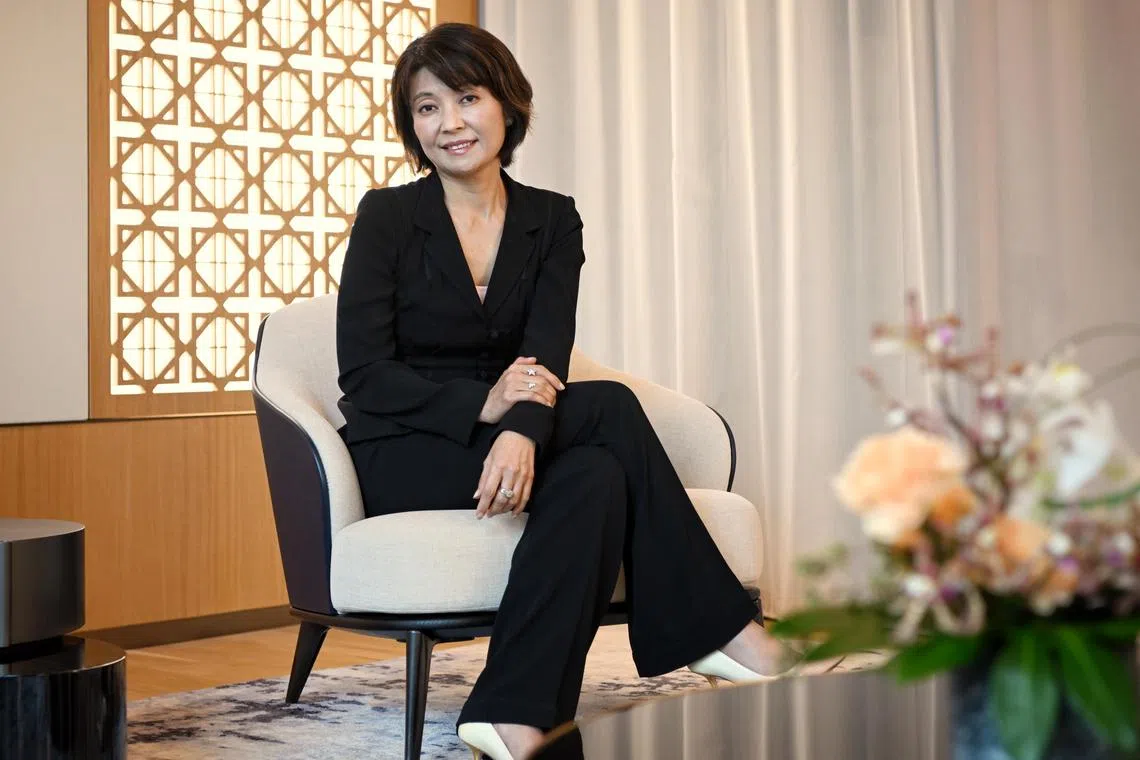Women-led firms in Asia-Pacific need more support to grow their businesses: JPMorgan
Sign up now: Get ST's newsletters delivered to your inbox

While more women have joined the workforce, the trend is slower when it comes to entrepreneurs and those in key management roles, says JPMorgan’s Asia-Pacific private bank chief executive Kwang Kam Shing.
ST PHOTO: KUA CHEE SIONG
Follow topic:
SINGAPORE – Women entrepreneurs need more targeted support in areas like networking and mentorship to overcome societal barriers that might hinder them from growing their businesses, given that these make up only a small proportion of high-growth companies across the Asia-Pacific.
The observation is gleaned from a report by JPMorgan released on Wednesday, which found that just 5.7 per cent, or 848 companies, of 15,000 high-growth private businesses in the region were founded, co-founded, led or managed by women as at the end of 2021.
High-growth businesses refer to companies that have secured significant funding in recent years – through Series A to J funding, private equity or private debt – and have potential to raise more capital for future growth.
Commenting on the report during a visit to Singapore last week, JPMorgan’s Asia-Pacific private bank chief executive Kwang Kam Shing said: “We have been serving ultra-high net worth individuals and families in the region, and I have to say, women are not well represented. For the most part, the decision-makers we are dealing with are men.
“But this is changing. We are seeing more and more women, whether they are first-generation founders or entrepreneurs of their own businesses, or daughters of founders. When they take over, we can see the value-add they bring to the business.”
While more women have joined the workforce, the trend is slower when it comes to entrepreneurs and those in key management roles, she added.
The report, which studied “women-powered” businesses across 12 Asia-Pacific markets – where women are founders or co-founders, or hold C-suite management positions – also found that Singapore had the second-highest proportion of women-powered businesses in the region, at 13 per cent of all high-growth businesses here.
Malaysia emerged top, with 16 per cent. Japan had the lowest proportion, at 2.5 per cent, followed by Taiwan at 4.1 per cent and China at 5 per cent.
These figures are not enough, said Ms Kwang.
“Half the world is made up of men and the other half is women, so in everything we do, half of the representation should come from women,” she said, citing McKinsey research estimating that advancing women’s equality could add US$4.5 trillion (S$6 trillion) to the Asia-Pacific’s collective annual gross domestic product in 2025.
Singapore women-powered businesses raised the second-highest volume of US$2.4 billion among the 12 Asia-Pacific markets. This accounted for 6.7 per cent of the total funds raised by these businesses in the region as at April 2022.
China took first place due to its large size, with women-powered businesses there raising US$27 billion, or 72 per cent, of total funds raised by these companies in the Asia-Pacific.
Still, Ms Kwang noted the persistence of a funding gap, adding: “The portion of capital (women-powered businesses) raise is really a much smaller proportion of what’s available in the market.”
Fifteen of the 98 high-growth, women-powered companies in Singapore made it to a list compiled by JPMorgan of the top 100 such businesses in the region.
The ranking uses methodology by professional services firm EY that considers a company’s revenue and workforce size, total funding since its inception, investor confidence and industry.
More than half of the Singapore list-makers came from the tech sector, a key driver of Singapore’s economy, noted JPMorgan.
To further boost women’s presence, the Government and business community can create more platforms to help them build their expertise and learn from one another, say industry players.
Ms Jennifer Zhang, chief executive and co-founder of Singapore-based artificial intelligence start-up WIZ.AI, which was featured on the list, suggested introducing more mentorship opportunities and a wider range of programmes to nurture women’s and girls’ interest in technology.
There can also be more opportunities for them to discuss emerging trends and products in the tech space, as well as develop their management skills, added Ms Zhang, who started her company in 2019.
“Most of the time, I think if you present a valuable company, idea and products, and you have a fitting personality and a good team, it shouldn’t be too much of a challenge (to get funding). No matter what, money is driven by facts more than gender,” she said.
Her company’s Talkbots can converse in various languages and colloquial forms of English such as Singlish and Taglish (a form of Filipino English). It has more than 200 large clients, including in banking, telecommunications and healthcare, in addition to smaller companies.
Ms Kwang noted that the Singapore Government has grown the entrepreneurship ecosystem
“But these are generic; more concerted efforts by the Government to help women entrepreneurs will beef up the percentage here,” added Ms Kwang, who previously headed JPMorgan in Singapore.
There is also a lack of networking opportunities for women entrepreneurs to learn from their peers and secure funding crucial to growing their businesses, she said.
“We have to create ecosystems that will help them get started so they can move on from there. Networking is really important when it comes to business,” she said, adding that these initiatives need to be improved in both the public and private sectors.
Singapore already has a handful of networks for women leaders, including one launched by the Singapore Business Federation
A group of executives – including Dr Sandhya Sriram, group CEO and co-founder of cultivated seafood and meat company Shiok Meats, another company on JPMorgan’s top 100 list – also set up non-profit organisation Women Venture Asia in 2022.
The network aims to connect women entrepreneurs, investors and business leaders and address the gender gap in entrepreneurship, according to its website. Dr Sandhya could not be reached for comment.
JPMorgan also has a Women on the Move initiative, which provides access to tools in areas such as business coaching and financial literacy for its 17,000 members across the region.
It also supported a US$900,000 project in 2021 to help small enterprises in Malaysia, the Philippines and Thailand recover from pandemic disruptions and adopt more sustainable business models, in collaboration with government agencies, employers, women entrepreneur associations and financial institutions.
Despite the current shortcomings, there are bright spots for women entrepreneurs and business leaders, said Ms Zhang. These include a growing number of women-led venture capital firms and a larger number of successful role models, she added.
Top high-growth Singapore firms founded or run by women
Insider (technology)
Homage (healthcare)
ADDX (financial services)
ShopBack (consumer goods and retail)
TurtleTree (healthcare)
Silent Eight (technology)
Parcel Perform (technology)
Shiok Meats (consumer goods and retail)
Speedoc (healthcare)
Atlan (technology)
WIZ.AI (technology)
PatSnap (technology)
ErudiFi (technology)
X0PA AI (technology)
Igloohome (manufacturing)


